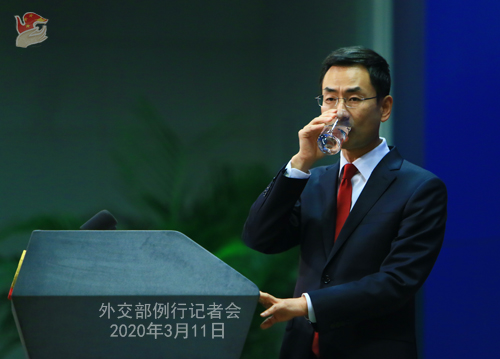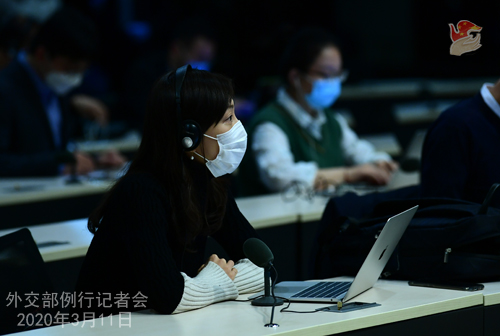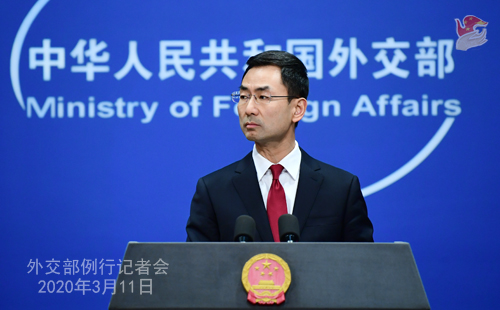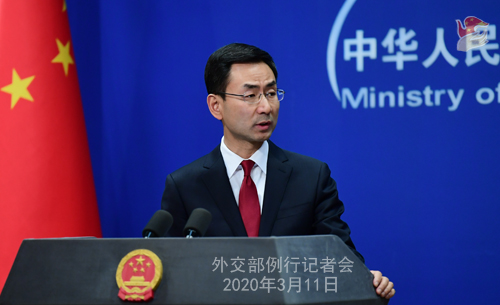| Foreign Ministry Spokesperson Geng Shuang's Regular Press Conference on March 11, 2020 |
| 2020-03-11 18:16 |
|
Here's the latest update on COVID-19 in China's mainland. According to the National Health Commission, March 10 saw 1,578 patients cured and discharged from hospital, bringing the tally to 61,475. Q: The COVID-19 epidemic is spreading fast in many places across the world. According to WHO Director-General Dr. Tedros, the threat of the coronavirus triggering a worldwide pandemic is now very real. Faced with such increasingly severe situation worldwide, what will China do to help enhancing international epidemic response? A: Thanks to the Chinese people's united and arduous efforts, the situation in China is getting better, with prevention and control efforts resulting in important progress at this stage. Meanwhile the epidemic broke out in many places across the world and keeps spreading, and some countries are suffering gravely from it. Against such a backdrop, it is all the more important and urgent for all countries to step up communication and cooperation in jointly fighting the epidemic and safeguarding regional and international public health security. While combating COVID-19 at home, China is ready to contribute to the global response. First, we will step up communication and coordination with the WHO and the international community. Exchange of information is an important part of a joint global response. After the virus outbreak, China shared its genetic sequence with the WHO at the earliest time possible and notified other countries in a timely manner. With openness, transparency and a high sense of responsibility for global public health security and people's well-being, we will continue information-sharing with the international community including the WHO. We will also strive to enhance coordination and cooperation to advance joint response at regional and global levels to stem the spread of the virus. Second, we will continue experience-sharing and exchange with other countries. China has so far published seven guidelines on COVID-19 diagnosis and treatment and six guidelines on prevention and control, all of which have been translated into multiple foreign languages. We would like to share these Chinese solutions with the world and hold exchanges over them. We've discussed our work against the epidemic in video conferences with the European Union, ASEAN, African Union, Caribbean Community, Shanghai Cooperation Organization, South Pacific island countries, Turkmenistan, Azerbaijan, Moldova, Georgia and others. We will continue exchanges and mutual learning with other countries and international organizations to jointly enhance regional and global capacity in safeguarding public health security. Third, we will send medical specialists to more countries and regions in need. Our Red Cross Society has sent experts to Iran and Iraq, where they conducted intensive work and were acclaimed by local authorities and people. We are planning to send medical experts to Italy as well and stand ready to help more countries in need in this way. Fourth, we will provide medicines and other supplies to the international community. Humanity shines through the dark cloud of the epidemic. China has decided to donate $20 million to the WHO. We've provided some countries with masks, medicines, protective suits and other supplies and exported medical supplies and equipment to those in urgent need of them. Sub-national governments and civil organizations are all extending a helping hand overseas. While fighting hard against the epidemic at home, China is ready to offer as much help as we can to countries in need. Fifth, we will ramp up cooperation with the international community on science and technology. We would like to collaborate with other countries in medicines, vaccines and testing reagents, contributing China's wisdom and proposals to securing an early global victory over the virus. China will contribute to the global fight in these five areas. We will work with the international community with solidarity and mutual assistance to overcome the epidemic.
Q: Last week your colleague said that confirmed cases of coronavirus were first found in China but its origin is not necessarily in China. So do you have any idea of where it comes from? A: The origin of the virus can only be determined by science. We need to rely on scientific and professional views. We don't hope to see anyone making an issue out of this to stigmatize other countries. It won't help the concerted international efforts to fight against the epidemic. Q: Yesterday the Foreign Ministers of China, France, Russia, the United Kingdom and the United States issued a Joint Statement on the Treaty on the Non-Proliferation of Nuclear Weapons (NPT). They reiterated commitment to the treaty in all its aspects, but also stressed that its success was not foreordained, nor is its future success guaranteed. How do you see the function of the treaty and the five countries' future cooperation? A: Yesterday the Foreign Ministers of China, France, Russia, the United Kingdom and the United States issued a Joint Statement, expressing political support for the NPT, reaffirming commitment to obligations under the treaty, and demonstrating their collective will to safeguard and strengthen its mechanisms. The NPT is the cornerstone of the international nuclear disarmament and non-proliferation regime and an essential part of the post-war global security system. Since coming into effect half a century ago, it has played an effective role in advancing nuclear disarmament, preventing proliferation, and promoting benefits of the peaceful uses of nuclear energy. This year marks its 50th anniversary. The 10th review conference will be held next month. It is an important mission for all parties to advance in a balanced manner the three goals of the NPT, namely, nuclear disarmament, nuclear non-proliferation and peaceful uses of nuclear energy to contribute to peace and progress in the world. With rising uncertainty and destabilizing factors in the international landscape and surging unilateralism, global strategic security is under severe impact. The efficacy and authority of the NPT is also being challenged. The five permanent members of the Security Council, as acknowledged nuclear weapon states under NPT terms, shoulder important responsibilities towards global peace and security. China hopes the five countries will follow the spirit of collaboration in this Joint Statement, take the upcoming review conference as an opportunity to step up coordination and cooperation, and uphold the international arms control regime and the world order based on international law. We will continue to work relentlessly towards this goal.
Q: Russia's State Duma passed a bill on constitutional amendments allowing incumbent and former presidents to run for the presidency in 2024. A referendum on the bill will be held on April 22. What's China's comment? A: We note that recently Russia is working on amending its Constitution and a referendum will be held next month. As Russia's comprehensive strategic partner of coordination for a new era, China hopes and believes that Russia will maintain social stability and economic development. We will continue to respect and support it in pursuing a development path in line with its own realities and support the Russian people's independent choice of a state governance model. We will continue to work with the Russian side to fulfill the core task of implementing the two heads of state's consensus and deepen the two sides' all-round strategic coordination and mutually-beneficial cooperation to deliver more benefits to our peoples. Q: With countries rolling out restriction measures in response to the spread of COVID-19, is China concerned that some supply and industrial chains may leave the country? Are you worried that global supply and industrial chains may be fractured? A: As we said repeatedly, the COVID-19 epidemic only affects the Chinese economy in a temporary and limited manner. The fundamentals sustaining sound economic growth remain unchanged, so do the factors underpinning high-quality development. The international community is still confident in China's economic prospects. China boasts the world's largest, most diversified and best equipped manufacturing system, which makes it an important link in global supply and industrial chains. The international community still has confidence in China's economic prospects and the resilience of our supply and industrial chains. We haven't seen any major movement of supply and industrial chains from China to other countries due to the epidemic. While fighting the epidemic, China has also been making coordinated efforts in economic and social development. As the domestic situation keeps getting better, major industries and enterprises including foreign ones are gradually resuming work and production, our social production and economic performance are getting back to normal. Such timely resumption of work and production protects and supports the stability and security of global supply and industrial chains. It once again demonstrates China's strength and sense of responsibility. The era of globalization means deeply integrated interests and highly intertwined industrial and supply chains. It is unrealistic and insensible to try to sever them or even trumpet "shifting" or "decoupling". There are many discussions on the impact of the COVID-19 outbreak on the world economic outlook. I think it mainly depends on how many countries will be affected and how long it will last, which comes down to the response of countries involved. In tough times, it is all the more important for the international community to stay united and make concerted efforts to overcome the disease, restore normal state-to-state exchange and cooperation, and bring the world economy back to the normal track.
Q: US Democratic Senator Bob Menendez yesterday called for action from the Department of Commerce on accusations of forced labor in Xinjiang, specifically with regard to certain US companies failing to stop purchasing from the region. Does China have a comment? A: China is country with rule of law. According to laws including Labor Law, Labor Contract Law, and relevant administrative regulations, all workers, regardless of ethnicity, race, gender or religious belief, sign voluntarily contracts with their employers on the basis of equality and consensus and get due payment. The labor rights and interests of citizens in Xinjiang of all ethnic groups are protected by law. There is no "forced labor" alleged by some with ulterior motives. We do hope certain individuals in the US could remove their colored lens, come to look at cooperation between Chinese and American companies in an objective and rational view, stop political maneuvering and work to enhance mutual trust and cooperation instead of the contrary. Q: Sudan's Prime Minister Hamdok of the transition government survived a bomb attack targeting his convoy on March 9 in the capital Khartoum. I wonder if you have any comment? A: China is shocked to learn of the attack targeting Prime Minister Hamdok's convoy. We deplore and condemn all forms of terrorism and firmly support Sudan in advancing political transition and maintaining national security and stability. Q: The Chinese side held a video conference on COVID-19 with medical experts from Pacific island countries yesterday. Can you give us more details? A: I shared news on the conference at yesterday's briefing. There was also a press release after the meeting concluded. I'll just give you a brief outline here. The video conference, which lasted for two hours yesterday afternoon, was attended by over 100 officials and medical experts from China and Pacific island countries. The Chinese experts talked about pathology, transmission, epidemic evolution, prevention and control as well as clinical treatment. They answered dozens of questions on virology, protection for medical personnel, targeted prevention and control, entry inspection and quarantine, therapeutic drugs and research and development of vaccines. After in-depth exchange, it was agreed to enhance communication and deepen cooperation to fight the epidemic. The Chinese side stressed at the meeting that with President Xi Jinping at the helm, the situation in China has sustained a positive momentum and normal work and life is resuming quickly. As fellow developing countries, China relates deeply to the difficulties posed by the epidemic to Pacific island countries. Our hearts are with them. We will provide them with necessary assistance to the best of our capabilities as the situation develops. Officials and experts from Pacific island countries at the meeting praised China's contribution to global public health security and commended China's experience which has set an exemplary standard for their response. President Xi's visit to Wuhan sent out the message of sure victory to the world. They thanked the Chinese side for its initiative in holding the conference, which gave them timely and important help in mounting an effective response at home.
|
| |||||||||||||||
|
|||||||||||||||






